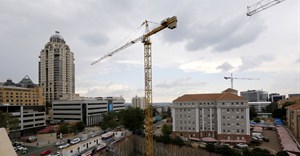
Subscribe & Follow
Phase 2 of R400m student housing project at Fort Hare set for 2020 completion

“Lack of accommodation is one of the biggest challenges we face at the University of Fort Hare. Most of our students come from rural areas and do not have accommodation options when they arrive here. Currently, our residences are barely able to accommodate 50% of our student population on our Alice campus. Our aim with this project is to house 65% of our students on this campus,” says vice-chancellor of UFH Professor Sakhela Buhlungu.
Developed by student accommodation group STAG African, the student village includes a new student centre and a dedicated postgraduate accommodation block. Phase one of the project, completed in 2014, saw 610 beds made available to the university. Completion of phase two will bring the total number of beds handed over to 2,047, giving UFH the highest ratio of students to beds in the country.
“Good student accommodation is about more than just beds. Our vision for this development goes beyond providing accommodation; we want to create a sense of community and a feeling of belonging,” says co-founder of STAG African John Schooling.

Growth in demand for higher education
Earlier this year, government acknowledged that an additional 300,000 beds are required to accommodate the nation’s students. The student housing crisis is a result of a growth in demand for higher education in recent years. The lack of accommodation has been directly liked to higher failure and dropout rates for first-year students.
“When a student is placed in temporary accommodation or is required to stay in accommodation that is unsafe, overcrowded and unhygienic, it’s no surprise when they can’t cope,” says Schooling. “We need to create the right conditions for academic success, and that starts with providing good accommodation. Once we do that, students can focus on achieving the results they need to be successful.”
STAG is in the process of funding the development of student housing all over Africa, including 34,000 beds at universities in Kenya, 4,700 in Malawi, 5,400 in Zambia and 3,000 in Lesotho.













